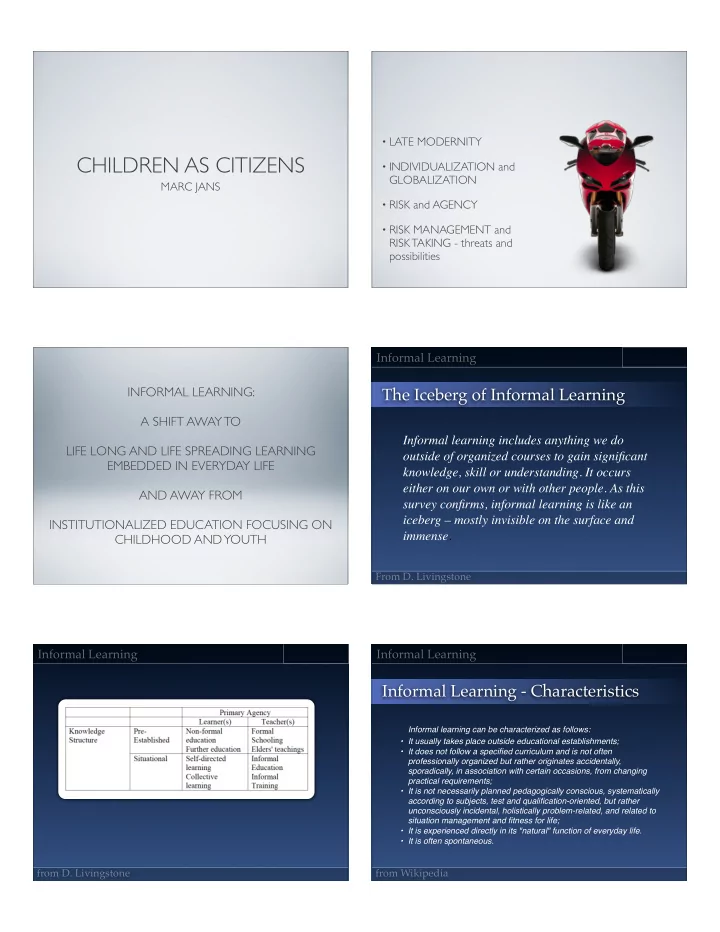

• LATE MODERNITY CHILDREN AS CITIZENS • INDIVIDUALIZATION and GLOBALIZATION MARC JANS • RISK and AGENCY • RISK MANAGEMENT and RISK TAKING - threats and possibilities Informal Learning INFORMAL LEARNING: The Iceberg of Informal Learning A SHIFT AWAY TO Informal learning includes anything we do LIFE LONG AND LIFE SPREADING LEARNING outside of organized courses to gain significant EMBEDDED IN EVERYDAY LIFE knowledge, skill or understanding. It occurs either on our own or with other people. As this AND AWAY FROM survey confirms, informal learning is like an iceberg – mostly invisible on the surface and INSTITUTIONALIZED EDUCATION FOCUSING ON immense . CHILDHOOD AND YOUTH From D. Livingstone Informal Learning Informal Learning Informal Learning - Characteristics Informal learning can be characterized as follows: • It usually takes place outside educational establishments; • It does not follow a specified curriculum and is not often professionally organized but rather originates accidentally, sporadically, in association with certain occasions, from changing practical requirements; • It is not necessarily planned pedagogically conscious, systematically according to subjects, test and qualification-oriented, but rather unconsciously incidental, holistically problem-related, and related to situation management and fitness for life; • It is experienced directly in its "natural" function of everyday life. • It is often spontaneous. from D. Livingstone from Wikipedia
Informal Learning Informal Learning Existing definition and example Informal knowledge is information that has not been externalized or captured and the primary locus of the Nearly everybody (over 90%) is involved in some form knowledge may be inside someone's head. For example, of informal learning activities that they can identify as in the case of language acquisition, a mother may teach a significant. The average number of hours devoted to child basic concepts of grammar and language at home, informal learning activities by all Canadian adults prior to the child entering a formal education system In such a case, the mother has a tacit understanding of over the past year was around 15 hours per week. This language structures, syntax and morphology, but she may is vastly more time than Canadian adults are spending not be explicitly aware of what these are. She in organized education courses (an average of about 3 understands the language and passes her knowledge on hours per week if we include the entire population). to her offspring . Note: Above example is adult centric from D. Livingstone from Wikipedia Informal Learning Informal Learning Informal learning - examples Other examples of informal knowledge transfer include instant messaging, a spontaneous meeting on the Internet, a phone call to someone who has information you need, a live one-time-only sales meeting introducing a new product, a chat-room in real time, a chance meeting by the water cooler, a scheduled Web-based meeting with a real-time agenda, a tech walking you through a repair process, or a meeting with your assigned mentor or manager. Experience indicates that much of the learning for performance is informal Those who transfer their knowledge to a learner are usually present in real time. Such learning can take place over the telephone or through the Internet, as well as in person. Note: the above quote deals with knowledge transfer, not other sources of acquisition from Wikipedia from D. Livingstone Informal Learning Informal Learning from D. Livingstone from D. Livingstone
Informal Learning Base Employment Competencies • Communication - write, speak, responsive, listen • Managing Self - learn, organization, manage strains, focus • Managing people and tasks - discussions, respond helpfully to differences, influence, • Mobilizing Innovation and Change - Managing Ambiguity - Research courses - creativity, risk taking, conceptualizing • Technical from D. Livingstone Informal Learning Time to Performance from: source on diagram Informal Learning Formal Informal Childhooding Informal Learning Image of the Child objects / subjects agents / co-agents Location systems world life world Source expert system self / others /environment Process organized bricolage Agenticity low high Reflexivity low high Age criteria chronological age experiential age Footer
PARTICIPATION DISCOURSES SYSTEM PERSPECTIVE • FUNCTIONING OF SOCIETY • CLOSE THE GAP BETWEEN INDIVIDUAL AND • ADULT AGENDAS COMMUNITY • ACTIVE WELFARE STATE - LABOUR MARKET - DEVALUE • SYSTEM PERSPECTIVE CHILDREN - STILL IN SCHOOL • LIFE WORLD PERSPECTIVE • INSTRUMENTAL - GOAL IS TO MANAGE RISK • NEGLECT SPECIFICITY OF CHILDHOODS Historical Trends LIFE-WORLD PERSPECTIVE 18th and 19th century: strong social participation and minimal protection 20th Century: Children increasingly sequestered in the home and school and away from the labour market and other • CITIZENSHIP IS MORE LIKE A LEARNING PROCESS IN public institutions with the goal of educating them to become ITSELF and not an outcome of educational efforts citizens. • CHILDREN’S SENSIBILITIES (environment, peace, etc) considered a base for actual citizenship rather than as a step Citizenship became the exclusive territory of adults and an along the way to actual citizenship endpoint for children. Strong protection and minimal social participation. Children have become an object of observation for adults, Now there is a tension between regulation and autonomy especially professionals relying on a predominately Learning to live and respond appropriately to this tension or psychological and pedagogical conception of children ambivalence is the challenge with little interest in the actual life of the child
CHILD SIZED CITIZENSHIP Children are embedded in their society and culture • Citizenship as a whole of rights (e.g., vote) - dependency and but there are protection • Citizenship as a whole of Some possible universal features of childhood: responsibilities (e.g. be decent) - playfulness Giving meaning: the appropriation of ecological zones • Citizenship as identity(I am Play: adult centric notions - developmental and pedagogical Canadian) - zones • Citizenship as participation (e.g., for children, play allows them to be agents involved in community life - adult child mutual dependency) From a life world perspective and understanding of citizenship as social involvement and participation, we can define children as citizens.
Recommend
More recommend